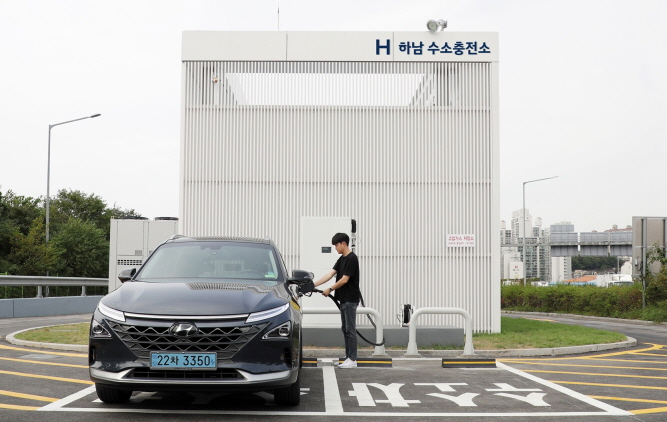
Today, the Korea Research Institute of Chemical Technology (KRICT) announced that it has succeeded in the development of an electrolyte membrane, a key material for use in hydrogen fuel cell powered vehicles.
The institute also announced that it signed a contract with Kosdaq-listed Chemtros over the transfer of process technology.
The core material is Perfluorosulfonic acid: A polymer composed entirely of fluorocarbons (C, F), and a material that plays a role of transmitting hydrogen ions (H+)
For this event, Lee Mi-hye, director of the Korea Research Institute of Chemical Technology, Seong-cheol Yoon, head of the Chemical Materials Research Center, Eun-ho Son, Head of the Interfacial Material Chemical Process Research Center, In-Joon Park (Research Director), CEO Dong-Hoon Dong-Hoon of Chemtros Co., Ltd. About 10 people from related parties attended the event.
Perfluorinated sulfonic acid ionomer is used in hydrogen vehicles, energy storage systems (ESS), distributed power supplies, and electrolyzers.
In particular, hydrogen cars do not emit environmental pollutants and are considered one of the next-generation transportation means that can achieve carbon neutrality, and the government is also planning to foster the hydrogen car industry.
According to the 2019 Roadmap for Activation of Hydrogen Economy by the Ministry of Trade, Industry and Energy, it is planned to increase the scale of production of hydrogen cars in Korea to 8.1 million units in 2022 and 6.2 million units in 2040 per year.
Hydrogen vehicles operate on the principle that water is discharged and electricity is generated by a chemical reaction between hydrogen and oxygen in a fuel cell. Therefore, an electrolyte membrane that causes a reaction with oxygen by passing hydrogen ions in a fuel cell is important. The manufacturing process of’Perfluorosulfonic Acid Ionomer (PFSA)’, an electrolyte membrane, is a technology that integrates all the technologies of fluorine chemistry.There are many sensitive variables such as moisture, temperature, and explosiveness, and the manufacturing process is very difficult and long* DuPont, AGC, Solvay, etc. Only some global companies can manufacture. Currently, it is entirely dependent on imports in Korea.
Lee Mi-hye, director of the Chemical Research Institute, said, “The manufacturing and utilization technology of perfluorinated sulfonic acid ionomer can be used in various places such as hydrogen cars and energy storage devices, thus contributing to the development of the national strategic industry, the Green New Deal and the hydrogen industry, and the realization of carbon neutrality. In addition, as a core material for materials, parts and equipment, it is expected that it will be able to foster related industries by localizing materials that have been imported entirely from overseas such as Japan.”
Research Director In-Joon Park said, “The PFSA manufacturing process has a high entry barrier, so only a few advanced countries, such as the United States, Japan, and Belgium, are owned. It is meaningful to develop this as an independent technology in Korea, and we will conduct follow-up research with companies so that commercialization can proceed well in the future.”
Read the most up to date Fuel Cell and Hydrogen Industry news at FuelCellsWorks




